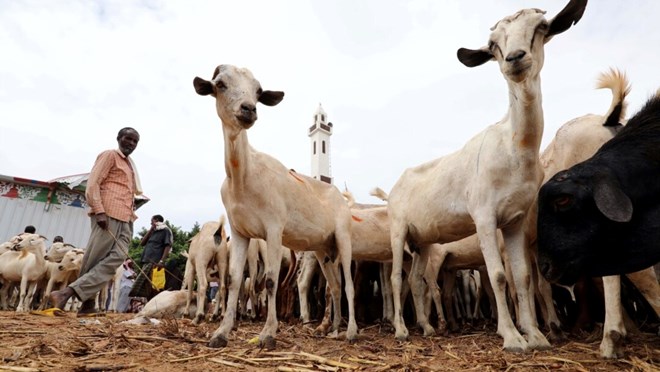
Sunday April 30, 2023

FILE - Somali people buy goats at a livestock market in Mogadishu, Somalia, Aug. 10, 2019.
Mogadishu (HOL) - As conflicts in Sudan and Ukraine disrupt food supply chains, Somalia is looking to capitalize on the growing food demands in Egypt, particularly in the livestock sector. With Egypt's food security status becoming a matter of concern, the country is actively seeking alternative sources of grains, wheat, and livestock.
The Sudanese crisis has opened the door for importing meat from Somalia and Chad to maintain food supplies for Egyptian citizens, according to Ali Al-Moseli, the Minister of Supply and Internal Trade in Egypt. Al-Moseli recently stated, "Because of the Sudanese crisis, there is an opportunity to import very good meat from Somalia and Chad to keep our citizens well-fed."
According to the Sudanese Investment Corporation, trade between Egypt and Sudan, particularly livestock and agricultural products, has grown since 2018. However, Sudanese exports to Egypt dropped to $364 million in 2020, from $469 million in 2018. In the first half of 2021, exports reached around $300 million, with livestock exports worth nearly half.
Somalia's primary exports include livestock, bananas, skins, fish, charcoal, and scrap metal. Over 60% of the country's population depends on the livestock sector for food and income. The Sudan crisis has encouraged Egypt to diversify food import sources, potentially increasing demand for Somali livestock products like camel, cattle, sheep, and goat.
The conflict in Sudan, a major exporter of livestock and grains to Egypt, is expected to result in decreased production and export of these commodities. Additionally, the conflict in Ukraine has caused a drop in the export of corn, wheat, and other grains, further impacting Egypt's animal feed supply and, subsequently, its livestock industry. The decline in availability has led to soaring prices for meat and dairy products in Egypt, which relies heavily on food imports due to its high population density and limited arable land.
Somalia's economy rebounded in 2021, with GDP growth of 2.9 percent, despite challenges including delayed elections, drought, supply chain bottlenecks due to COVID-19, and increased insecurity. However, the country faces an extreme drought, with the US government's Humanitarian Information Unit estimating 3 million livestock have died.
To capitalize on Egypt's growing food demands, Somalia needs to overcome constraints like political instability, security concerns, and drought impacts. Investment in innovative strategies, boosting production, and maintaining a reliable supply chain can help Somalia seize this opportunity.
The Sudanese crisis has seen fighting erupt across the country as powerful rival military factions battle for control of the African nation and its future. The conflict has led to the closure of embassies and the evacuation of foreign nationals, with more than 450 people killed and another 4,000 wounded.